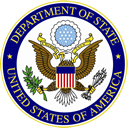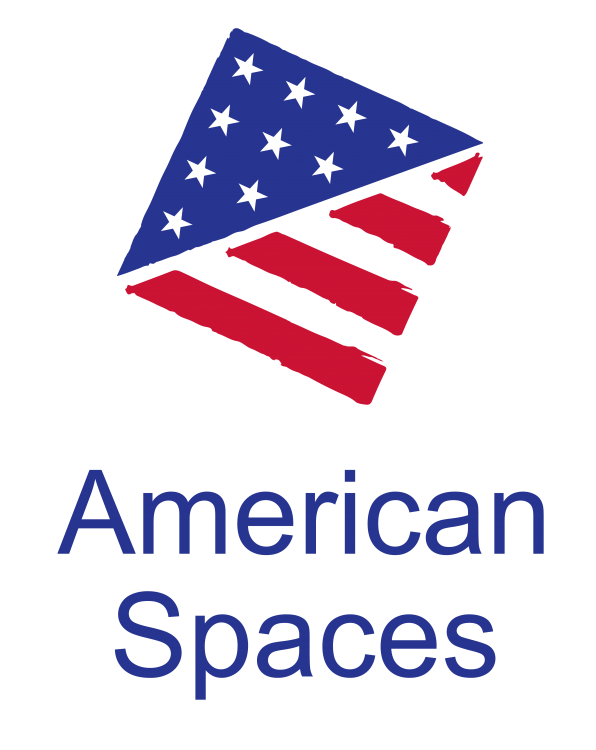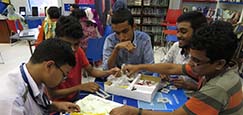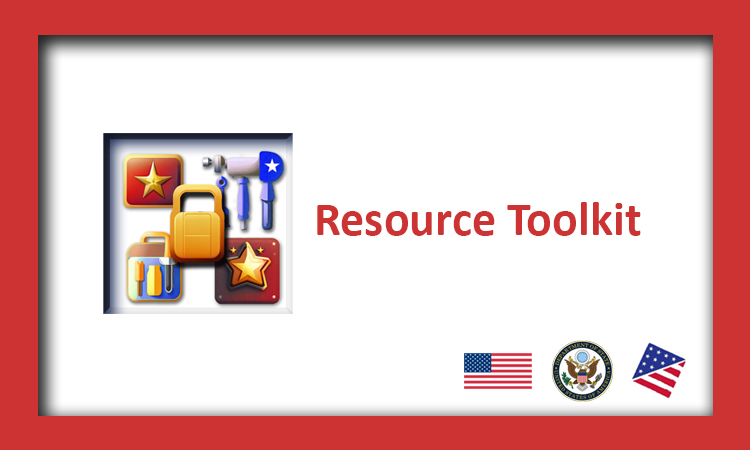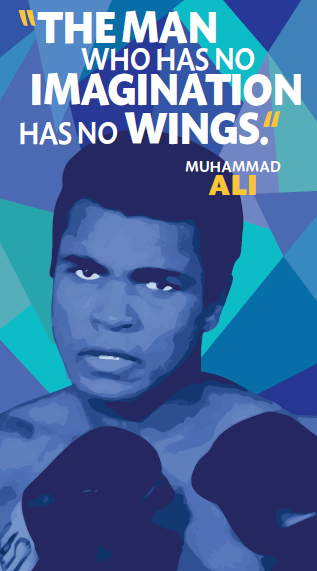MUHAMMAD ALI
PROGRAM TOOLKIT FOR AMERICAN SPACES
An American Hero
This toolkit is designed for programming at American Spaces to recognize and celebrate Muhammad Ali, a true American hero who embodies the spirit of strength, perseverance, and American exceptionalism.
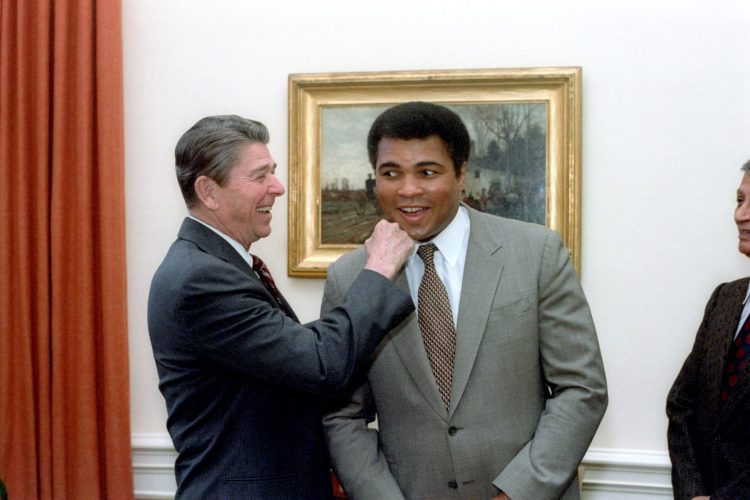
KEY DEFINITIONS
American Exceptionalism – the belief that the United States has a unique character and role in the world, often associated with values like individual achievement, freedom, and opportunity.
Boxing – a combat sport in which two people throw punches at each other for a predetermined amount of time in a boxing ring, to outscore or knock out the opponent.
Civil Rights Movement – a period in the 20th century, primarily in the 1950s and 1960s, when African Americans and their allies fought for equal rights and the end of racial segregation and discrimination in the United States.
Conscientious Objector – a person who refuses military service because of freedom of thought, conscience, or religion. Ali claimed conscientious objector status when he refused the draft during the Vietnam War.
Freedom of Speech – a core American value and Constitutional right that allows individuals to express their opinions and ideas without government restraint.
Heavyweight Champion – the best boxer in the heaviest weight division in professional boxing, traditionally a symbol of great strength and prestige. Muhammad Ali won this title three times.
Humanitarian – a person who seeks to promote human welfare and reduce suffering, often by engaging in charitable work and advocating for social reform.
Role Model – a person whose behavior, example, or success can be emulated by others, especially younger people. Ali became a global role model for courage, activism, and athletic excellence.
Title – the position or award of someone who wins first place in a competition.
INTRODUCTION
As a world champion boxer who dominated his sport, Muhammad Ali (1942-2016) showcased American exceptionalism on the global stage, embodying the strength and perseverance that define the nation’s greatness. His unmatched charisma and talent not only made him a household name but also reinforced America’s leadership in sports and culture.
This toolkit provides videos, articles, and lesson plans for American Spaces audiences to learn about Ali’s role in American sports culture and the impact of his achievements around the world.
WHO WAS MUHAMMAD ALI?
The Greatest: A Fighter for More Than Titles
Muhammad Ali was a famous American boxer, known worldwide as one of the best athletes in history. He was born in 1942 in Louisville, Kentucky, and his birth name was Cassius Clay. Ali became the world heavyweight champion in boxing three times and won a gold medal at the 1960 Olympics. In addition to fighting in the boxing ring, he was known for standing up for his beliefs and fighting for various causes throughout his life. He spoke out in support of the Civil Rights Movement, for freedom of religion (he changed his name to Ali after becoming a Muslim in the 1960s), and against the Vietnam War. Later in life, Ali became a global ambassador for American goodwill, using his celebrity status to promote peace, religious liberty, and humanitarian efforts, advancing U.S. influence worldwide.
“Float like a butterfly, sting like a bee.
Muhammad Ali (referencing boxer George Foreman)
His hands can’t hit what his eyes can’t see.
Now you see me, now you don’t.
George thinks he will, but I know he won’t.“
“Impossible is just a big word thrown around by small men who find it easier to live in the world they’ve been given than to explore the power they have to change it. Impossible is not a fact. It’s an opinion. Impossible is not a declaration. It’s a dare. Impossible is potential. Impossible is temporary. Impossible is nothing.”
Muhammad Ali
“Champions aren’t made in gyms. Champions are made from something they have deep inside them — a desire, a dream, a vision. They have to have the skill, and the will. But the will must be stronger than the skill.”
Muhammad Ali
“The Service you do for others is the rent you pay for your room here on Earth.”
Muhammad Ali
MORE RESOURCES
Digital Media
- This graphic (above) of Muhammad Ali can be used by American Spaces for wall coverings, posters, or digital marketing. It is part of the American Spaces graphics collection available in Google Workspace. To request access, please click the image to and allow 48 hours for a response.
- Library of Congress Research Guide on Cassius Marcellus Clay, Jr. (Muhammad Ali) provides access to materials related to “Cassius Marcellus Clay Jr.” in the Chronicling America digital collection of historic newspapers.
- National Archives records on Muhammad Ali (contains African American Heritage feature with catalog records, photographs, and YouTube video links).
- Smithsonian holdings related to Muhammad Ali’s life.
- Float Like a Butterfly collection story from National Museum of African American History and Culture.
- Chronology of the Case Against Muhammad Ali for Selective Service Violation – this online tool from the National Archives uses primary sources to teach students about Ali’s conscientious objection to the Vietnam War and the court case that went all the way to the U.S. Supreme Court.
OVERDRIVE BOOKS
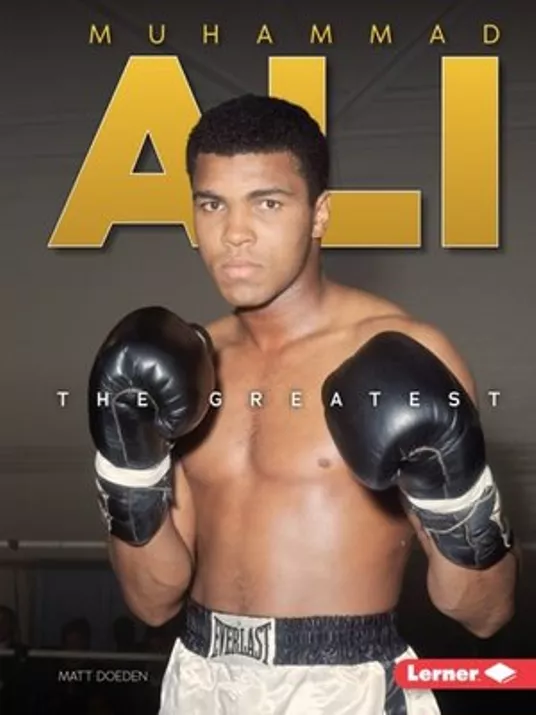
Muhammad Ali by Matt Doeden, 2017.
Muhammad Ali, born Cassius Marcellus Clay Jr., was known for his battles in the ring as well as his achievements outside of it. An outspoken activist, he joined the Nation of Islam and followed Malcolm X during the Civil Rights Movement. He refused to fight in the Vietnam Was for a cause he did not believe in, even though some saw him as a coward. Even with failing health from Parkinson’s disease, Ali continued to fight for and defend people who were less advantaged. Follow Ali’s journey from amateur to heavyweight champion and learn how he fought in the boxing ring and advocated for peace and justice outside of it.
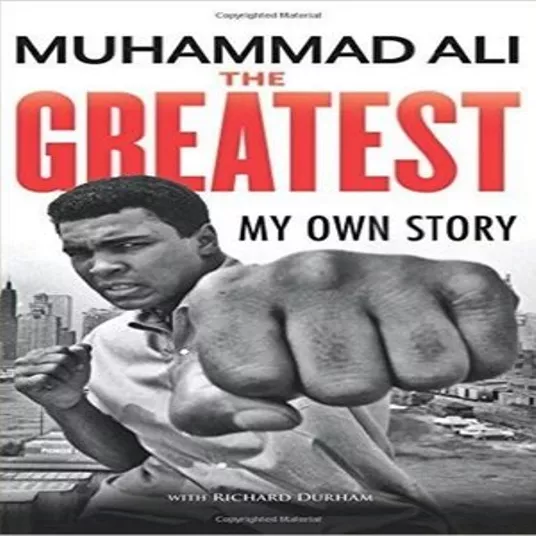
The Greatest by Muhammad Ali and Richard Durham, edited by Toni Morrison, 2017.
In his own words, the heavyweight champion of the world pulls no punches as he chronicles the battles he faced in and out of the ring in this fascinating memoir edited by Nobel Prize-winning novelist Toni Morrison.
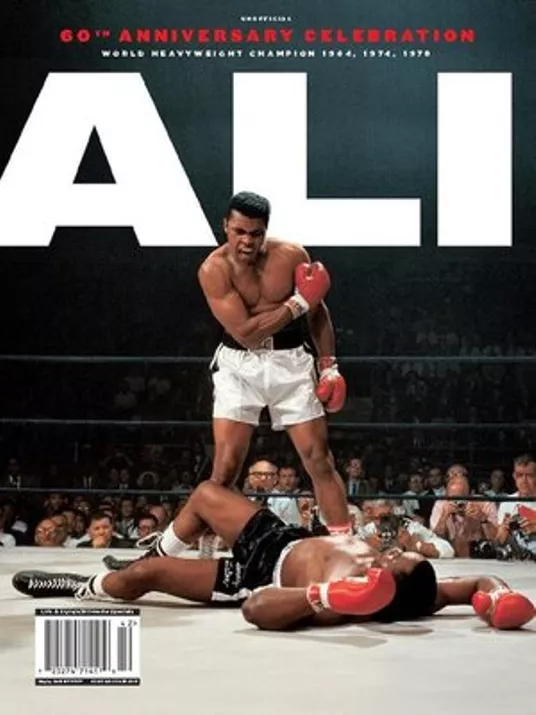
Muhammad Ali – 60th Anniversary Celebration special edition magazine, 2024.
Muhammad Ali was the greatest boxer of all time. He was the greatest athlete-advocate of all time, too – a relentlessly outspoken figure in the battle for peace and racial justice. He was, simply stated, the most significant sports figure of the 20th century. And he never backed down from a fight. To commemorate the 60th anniversary of his first heavyweight title – a shocking upset of the great Sonny Liston on Feb. 25, 1964 – we remember the bouts, in and out of the ring, of a person who defined what it means to be the Greatest of All Time.
LESSON PLANS
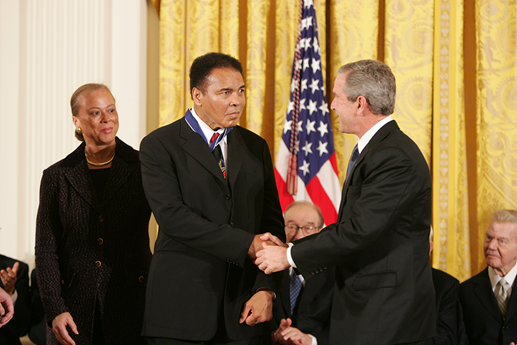
Muhammad Ali | Boxer and Civil Rights Activist – this lesson plan from PBS Learning Media includes a detailed background of Ali’s life, a 10-minute video with classroom activity, and discussion questions. It emphasizes primary sources and aligns with United States national education standards.
Life of Muhammad Ali – this lesson plan from C-SPAN Classroom includes video clips of biographer Jonathan Eig talking about Muhammad Ali’s boxing career, religious conversion, actions during the Vietnam War, and post-retirement life. It also includes classroom setup instructions, discussion questions, vocabulary, and references.
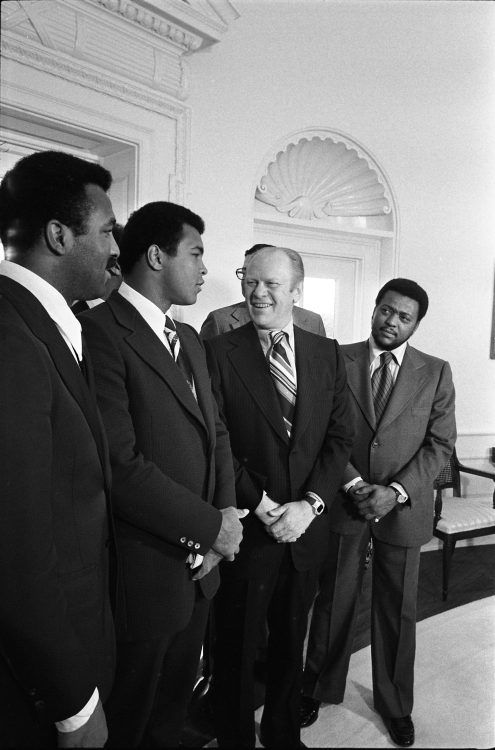
KANOPY FILMS
- Ain’t Gonna Shuffle No More: 1964-72. Directed by Sam Pollard and Sheila Bernard. PBS, 1990. 56 minutes.
A call to pride and a renewed push for unity to galvanize black America. World heavyweight champion Cassius Clay challenges America to accept him as Muhammad Ali, a minister of Islam who refuses to fight in Vietnam. Students at Howard University in Washington, D.C., fight to bring the growing black consciousness movement and their African heritage inside the walls of this prominent black institution. Black elected officials and community activists organize the National Black Political Convention in Gary, Indiana, in an attempt to create a unified black response to growing repression against the movement. (PG Rating. Public performance rights included.)
- City of Ali. Directed by Graham Shelby. Giant Pictures, 2021. 1 hour 21 minutes.
The story of how the death of Muhammad Ali brought the people of his Kentucky hometown – and the world – together for one unforgettable week. (TV-MA Rating. Public performance rights included.)
Videos
- Muhammad Ali addresses the U.N. Special Committee against Apartheid, 1978 (Youtube video, 1 minute long)
- Muhammad Ali Ken Burns documentary series available via streaming on PBS. Includes 4-episode documentary, iconic photos, downloadable graphics with Ali facts and quotes, interactive timeline, and other digital resources. (Not covered by MPLC license; for individual use only.)
Articles
- Understanding First Amendment Freedoms through the Remarkable Life of “The Greatest” – Muhammad Ali.
- Feat of Clay: Muhammad Ali’s Legal Fight against the Vietnam Draft.
- What’s in a Name? Muhammad Ali and the Politics of Cultural Identity.
- Muhammad Ali, “The Greatest”.
- H.R.1832 – Muhammad Ali Boxing Reform Act.
- H.R.709 – Muhammad Ali Congressional Gold Medal Act.
DISCUSSION QUESTIONS
- Muhammad Ali risked his career to speak out against the Vietnam War. His conscientious objection led to great criticism and legal challenges. Why is freedom of speech an important American value and how did Ali’s actions show this?
- Ali changed his name and publicly embraced a new faith despite public backlash. How does Ali’s assertion of his identity connect to American values like individual freedom and religious liberty?
- After being banned from boxing, Ali returned to reclaim the world title. What does his comeback teach us about resilience and why is that such a celebrated American trait?
- In what ways did Muhammad Ali represent America to the rest of the world?
The views expressed in these links and resources do not necessarily reflect those of the U.S. government.
Updated November 2025

